SCNOW Virtual Summit: Accelerating the Transition to Circularity
The SCNOW Virtual Summit: Accelerating the Transition to Circularity is more than just an online event — it’s a gathering place for anyone passionate about creating a more sustainable, circular future.
Organized by Sustainability & Circularity NOW (SCNOW), Thieme Chemistry’s international, peer-reviewed, Gold Open Access journal, this flagship summit brings together global voices to address critical challenges in sustainability and circularity.
Over two energizing half-day sessions, you’ll hear from leading minds in research, industry, and policy – all driving innovation in circular chemistry, sustainable technologies, and circular economy strategies. Whether you’re looking to exchange ideas, spark new collaborations, or stay ahead of emerging trends, this summit is designed with you in mind.
Join the conversation. Be part of the change.
Come connect with a global community working to transform sustainability ambitions into real-world action – and help shape a better tomorrow.
Don’t miss this opportunity to be part of a global conversation on sustainability and circularity. Secure your free spot today!
Meet the Speakers
Hear from leading experts in sustainability and circularity, including researchers, industry innovators, and policymakers.
Prof. Audrey Moores
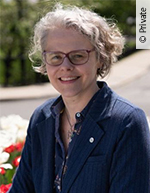
Prof. Audrey Moores is a Full Professor of Chemistry and associate director of the Facility for Electron Microscopy Research (FEMR) at McGill University.
She completed her PhD from the Ecole Polytechnique, France in 2005, under the supervision of Prof. Pascal Le Floch and received the Best Thesis award of the Ecole Polytechnique that year. She was a post-doctoral fellow at Yale University in 2006 under the guidance of Prof. Robert H. Crabtree, funded by a Lavoisier fellowship from the European Union.
She serves as a topic editor for ACS Sustainable Chemistry & Engineering. She became a member (2020) and president (2024-26) of the College of New Scholars, Artists and Scientists of the Royal Society of Canada, which is the junior body of the equivalent to a Canadian Academy of Science. Between 2007 and 2017, she held a Canada Research Chair in Green Chemistry. In 2019 she received a Fessenden Professorship awarded by the faculty of science at McGill University towards the commercial development of the clean transformation of crustacean shells into chitosan. In 2021 she received the Canadian Chemistry and Chemical Engineering Award for Green Chemistry. She was also a university-funded visiting professor at the University of Tokyo from January to June 2024. In 2024, she chaired the Gordon Research Conference in Green Chemistry.
With her group, she focuses on sustainable solutions for nanoparticles and biopolymer synthesis as well as catalyzed reactions, with an interest in waste biomass valorization, earth abundant starting materials and high atom economy. She is also an expert and global teacher of green and sustainable chemistry, which she has taught in Mexico, Ukraine, Indonesia and Japan and is a passionate public speaker on issues of women in science, green chemistry and languages of research.
Prof. Alexei Lapkin
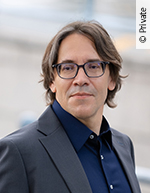
Prof. Alexei Lapkin graduated with an MChem from Novosibirsk State University, specialising in membrane gas separation.
He then worked at Boreskov Institute of Catalysis prior to moving to the University of Bath where he was employed as a research officer, which allowed him to complete his PhD in the area of multiphase membrane catalysis. In 1997 he worked as a junior scientist at the Department of Chemical Engineering, University of Bath, and from 2000 until 2009 he acted as a research officer there. From 2009 until 2013 he was appointed as lecturer at the School of Engineering, University of Warwick. In 2013 he became Professor of Sustainable Reaction Engineering at the Department of Chemical Engineering and Biotechnology, University of Cambridge.
Prof. Sonja Herres-Pawlis
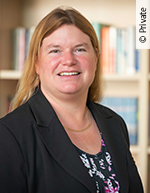
Prof. Sonja Herres-Pawlis is Chair of Bioinorganic Chemistry at RWTH Aachen University, Germany.
She studied chemistry at the University of Paderborn, where she also earned her Ph.D. in 2005 for research on oxygen activation mediated by copper complexes. Following a postdoctoral stay at Stanford University with Prof. T.D.P. Stack, she completed her habilitation at the TU Dortmund and held a professorship in coordination chemistry at LMU Munich before joining RWTH Aachen in 2015.
Prof. Herres-Pawlis works in the fields of bioinorganic chemistry and polymerisation catalysis, particularly known for her work on sustainable polymerization and depolymerization processes and research data management. She serves in several national research initiatives, including as Co-Speaker of NFDI4Chem and of the GDCh Section on Sustainable Chemistry. She is also Speaker of the RWTH Aachen Strategy Board. Her achievements have been recognized with numerous awards, including the Innovation Prize of North Rhine-Westphalia, the Arnold-Sommerfeld Award of the Bavarian Academy of Sciences and the Chemistry Europe Fellowship (2021/22).
Dr. John Warner
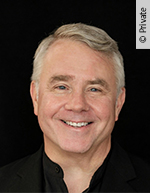
Dr. John Warner is the CEO and CTO of Technology Greenhouse and widely recognized as one of the founders of the field of green chemistry.
He co-authored the seminal book Green Chemistry: Theory and Practice with Paul Anastas in 1998, which introduced the foundational 12 Principles of Green Chemistry.
Dr. Warner completed his undergraduate studies at UMASS Boston and earned his PhD in chemistry from Princeton University. Over the course of his career, he has worked equally across industry, academia, and entrepreneurship.
In industry, he spent nearly a decade as an industrial chemist at Polaroid, where he was awarded over 360 patents. His contributions to the field were recognized with the prestigious Perkin Medal in 2014.
In academia, he served as a tenured full professor of chemistry and plastics engineering at the University of Massachusetts for more than 12 years. There, he established the world’s first PhD program in green chemistry. He has authored over 120 scientific publications and received the U.S. Presidential Award for Excellence in Science Mentoring in 2004, presented by President George W. Bush. In 2022, he was awarded the August Wilhelm von Hofmann Medal by the German Chemical Society. Dr. Warner currently holds six academic appointments around the world, including at Monash University (Australia), Technical University of Berlin (Germany), Chulalongkorn University (Thailand), Somaiya University (India), University of Birmingham (UK), and Rochester Institute of Technology (USA).
As an inventor and entrepreneur, his innovations are at the heart of nine diverse companies spanning fields such as photovoltaics, neurochemistry, construction materials, water harvesting, and cosmetics. In 2016, he was named a Lemelson Invention Ambassador by the American Association for the Advancement of Science (AAAS) and the Lemelson Foundation.
Dr. Warner has been widely recognized for his visionary leadership in green chemistry. He was named one of “25 Visionaries Changing the World” by Utne Reader and cited as one of the most influential people in the chemical industry by ICI–Sciences. In Berlin, the “John Warner Center for Startups in Green Chemistry” was named in his honor.
Prof. Katalin Barta
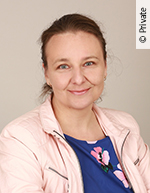
Prof. Katalin Barta is professor of Chemistry at the University of Graz, Austria.
She started her independent career in 2013 at the Stratingh Institute for Chemistry, University of Groningen. Since 2019 she leads the sustainable catalysis unit at the University of Graz. Her research program addresses key scientific questions to enable the transition to a bio-based, circular economy. This involves catalyst and method development, alternative solvents and the development of biorefinery concepts, focusing on lignocellulosic biomass. Focus is devoted to the development of efficient catalytic pathways to access pharmaceutically active compounds, surfactants, fuels, as well as recyclable polymers and materials from renewable resources. Her group has made pioneering contributions to emerging biorefinery concepts, especially in the area of ‘lignin-first’ chemistry. Her work has been recognized by prestigious grants and prizes, including the Styria Innovation Award (2022), the ACS Sustainable Chemistry & Engineering Lectureship Award (2020), the Netherlands Catalysis and Chemistry Conference Award (2019), and she is recipient of three ERC Grants and member of the Cluster of Excellence ‘Circular Bioengineering’.
She serves as president of the division Green and Sustainable Chemistry of the European Chemical Society, chair of the editorial board of ChemSusChem, as well as international advisory board member of the journals ACS Sustainable Chemistry & Engineering, Chem Catalysis and Green Chemistry.
Prof. Liane M. Rossi
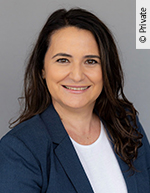
Prof. Liane M. Rossi holds a BS degree in Chemical Engineering (UFRGS, Brazil, 1994) and a PhD degree in Chemistry (UFSC, Brazil, 2001).
After postdoctoral research experience in Brazil and the USA, in 2004, she joined the Institute of Chemistry at the University of São Paulo (USP) and became a Full Professor in 2016. Her research interests in the field of chemistry and catalysis include novel approaches for the synthesis of supported metal nanoparticles with controlled size, morphology and surface properties, catalyst recovery and recycling, new reactivity patterns at metal-ligands interfaces, bimetallic and hybrid catalysts, and the concepts of green chemistry for selective transformations. The main catalytic processes currently under study are selective hydrogenations and oxidations, biomass conversion into chemicals, and CO2 capture and conversion. She currently serves as Coordinator of the CCU Program at the Research Centre for Greenhouse Gas Innovation (RCGI), sponsored by FAPESP/SHELL/USP (São Paulo, Brazil). Prof. Rossi is a permanent member of the Brazilian Academy of Science, effective since January 2021. She is an Editorial Advisory Board Member at ACS Catalysis (ACS) and Catalysis Science and Technology (RSC), and an International Advisory Board at Angewandte Chemie. She is a member of the Brazilian Chemical Society (SBQ), Brazilian Catalysis Society (SBCAT), and American Chemical Society (ACS). She is the author or co-author of about 150 papers published in indexed peer-reviewed scientific journals which received 7000 citations and an H=47. Prof. Rossi has been awarded the King Carl XVI Gustafs professorship in environmental science (Konung Carl XVI Gustafs professur i miljövetenskap) for 2023/24.
Dr. Benjamin Kühne
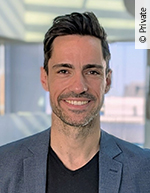
Dr. Benjamin Kühne leads Sustainability Assessments at Merck KGaA in Darmstadt, Germany.
He focuses on environmental footprinting, product carbon footprints (PCF), life cycle assessments (LCA), and circular economy (CE) projects.
He currently co-leads the GreenSpeed project, driving sustainable innovation.
Previously, he was Senior Manager for Circular Economy at Merck, managing CE initiatives and greenhouse gas emission projects. Before Merck, Benjamin worked at BASF for nearly five years, heading the Process Development Lab with a focus on renewables, bio-based chemicals, and sustainability. He also managed pilot plant operations and engineering projects.
Benjamin began his career as a research scientist at Südzucker and TU Darmstadt, specializing in biomass conversion to bio-based chemicals. He earned his Master of Science in Chemistry from Technische Universität Darmstadt in 2013 and completed his PhD with expertise in sustainable chemical processes.
Prof. Vivek Polshettiwar
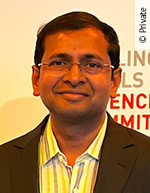
Prof. Vivek Polshettiwar leads a research group at the Tata Institute of Fundamental Research in India.
His work focuses on nanocatalysis to combat climate change. He earned his PhD in 2005 and completed postdoctoral research in France and the USA before founding his independent group at King Abdullah University of Science and Technology in 2009. He joined Tata Institute in 2013.
His research centers on designing novel nanomaterials with tunable properties for sustainable catalysis, including the development of the innovative “Black Gold.” Prof. Polshettiwar has been recognized with prestigious awards such as the Shanti Swarup Bhatnagar Prize, the IUPAC-CHEMRAWN VII Prize, and the Falling Walls Award.
Prof. Zhimin Liu
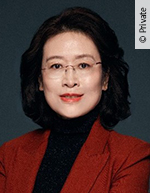 Professor Zhimin Liu earned her PhD from China Petroleum University in 1997.
Professor Zhimin Liu earned her PhD from China Petroleum University in 1997.
After postdoctoral research at the Institute of Chemistry, Chinese Academy of Sciences (ICCAS), she joined ICCAS and was promoted to full professor in 2008. Her research focuses on green and sustainable chemistry, particularly the catalytic transformation of renewable and recyclable carbon resources, including CO₂, biomass, and spent plastics.
She has authored around 400 peer-reviewed publications and holds 30 patents. A Fellow of both the Chinese Chemical Society and the Royal Society of Chemistry (since 2019), Professor Liu has received numerous prestigious awards in China, such as the China National Fund for Distinguished Young Scientists, the Second Class Prize of the National Natural Science Award, and the National Invention Prize. In 2025, she was honored with the IUPAC Award for Distinguished Women in Chemistry or Chemical Engineering.
Poster Session
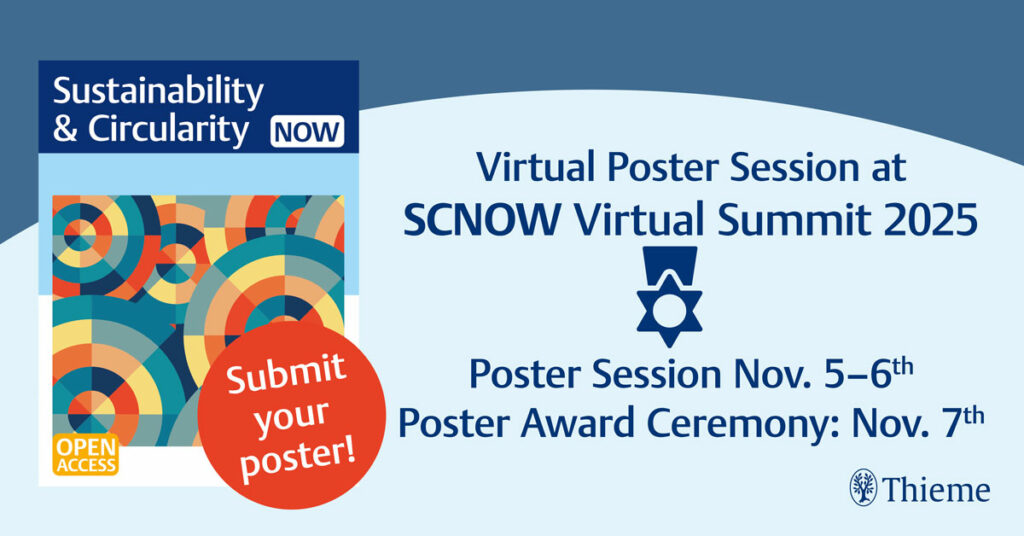
Showcase your research and engage with peers during our virtual poster session. Share your poster on LinkedIn/Bluesky
using the hashtag #SCNOWPoster2025 for a chance to win the Best Poster Prize!
About Sustainability & Circularity NOW (SCNOW)
Meet the Chairs and Organizers
The SCNOW Virtual Summit is proudly organized by representatives from the journal and Thieme Chemistry, in collaboration with members of the Editorial Board.
Below is the list of chairs and organizers:
Chairs:
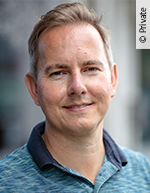 Chris Slootweg – Editor-in-Chief of SCNOW
Chris Slootweg – Editor-in-Chief of SCNOW
Chris Slootweg is Full Professor of Sustainable Chemistry at the University of Amsterdam. His research focuses on main-group and phosphorus chemistry for circular solutions. He integrates computational and synthetic methods to advance safe-by-design approaches.
Chris began his academic career in 2006 and joined UvA in 2016. He aims to create molecules and processes with minimal environmental impact. He is co-founder and advisor of SusPhos BV, which upcycles phosphate-rich waste. As Editor-in-Chief of SCNOW, he champions impactful, forward-looking sustainability research.
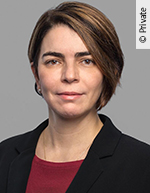 Prof. Dr. Dr. Vania Gomes Zuin Zeidler – Associate Editor of SCNOW
Prof. Dr. Dr. Vania Gomes Zuin Zeidler – Associate Editor of SCNOW
Prof. Vânia Gomes Zuin Zeidler is a W3 Professor at the Institute of Sustainable Chemistry, Leuphana University Lüneburg. Her research centers on green chemistry, sustainable extraction, biorefineries, and analytical chemistry. She is a Fellow of the Royal Society of Chemistry and a recipient of several prestigious international awards, including the ACS-CEI Award and IUPAC’s CHEMRAWN VII Prize. Prof. Zuin Zeidler has an extensive publication record and is a passionate advocate for sustainable science education. She maintains strong academic ties with UFSCar in Brazil and plays an active role in advancing international collaborations in green and sustainable chemistry.
Organizers:
![]() Dr. Jeanne Andres – Executive Publisher at Thieme Chemistry
Dr. Jeanne Andres – Executive Publisher at Thieme Chemistry
Jeanne is the Executive Publisher for Thieme Chemistry’s flagship titles: Synthesis , Synlett , SynOpen , and SynFacts and has recently taken on this role on Sustainability & Circularity NOW (SCNOW). As a senior manager working in publishing strategic development and implementation, with expertise in leadership, community engagement and relationship management, she is skilled in overseeing and enabling high-performing teams, and qualified in change management, with over 12 years of experience in STM Publishing. She holds a PhD in chemical engineering from the University of Cambridge, where she investigated environmental fluid dynamics focusing on the geostorage of carbon dioxide. Prior to her PhD, she previously taught at university in the Philippines. She is based in Cambridge, UK.
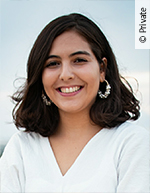 Fadwa Hawari – Journal Development Editor at Thieme Chemistry
Fadwa Hawari – Journal Development Editor at Thieme Chemistry
Fadwa is a Journal Development Editor at Thieme Chemistry, supporting the development of the journal Sustainability & Circularity NOW (SCNOW) since November 2023. She earned her engineering degree from the National Institute of Applied Sciences and Technology (INSAT) in Tunisia in 2021 and began her R&D career with a final-year internship at CNRS in France, focusing on green chemistry and lignin valorization. Prior to entering publishing, she worked as an R&D engineer in Germany, contributing to research projects in pyrolysis and sustainable innovation.
